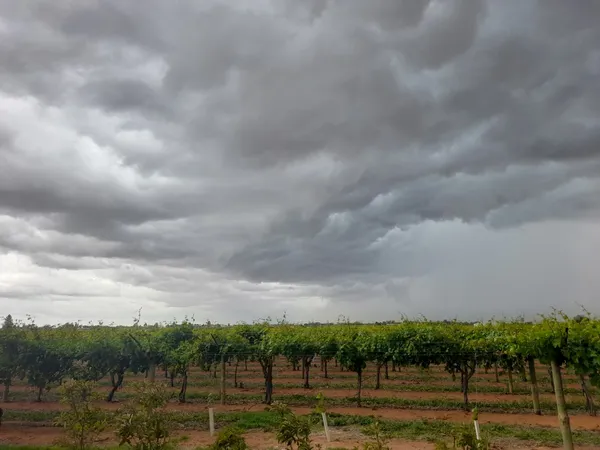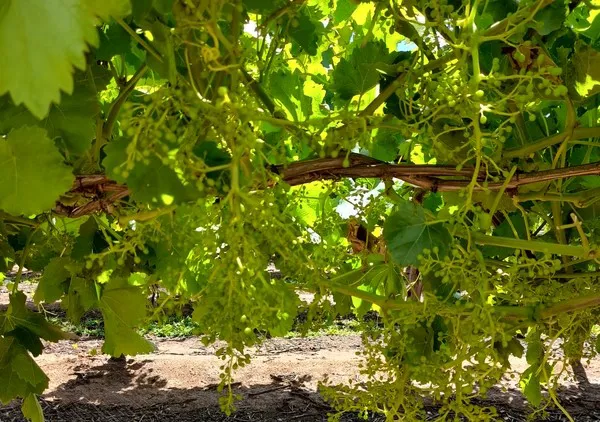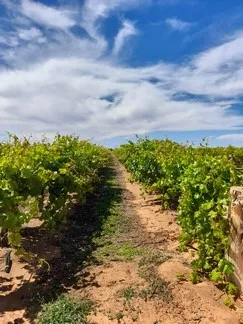Strong winds have added another challenge as one of Victoria's leading table grape growers prepares for the summer season.
Budou Farms co-owner Enrique Rossi believes it is a by-product of climate change, and farmers can no longer rely on average temperatures of decades ago, as each season is throwing up more and more unique challenges.
"If (growing) season 2020-21 was challenging; 2021-22 broke all the records," Mr Rossi said. "We changed from dust storms every Friday to rain or wind storms over the weekend, followed by cold cloudy days, with one day of heat (over 32 degrees). In the last 2 years, Mildura was called 'Dustura', and now it is 'Windura'. Yes, climate change is here. We cannot go for the average temperatures of decades ago anymore, as those averages work from extreme temperatures and this by strange luck, matches with critical phenological stages, such as bloom, berry sizing, veraison, etc. But that is farming. We cannot change the weather, but we have to use techniques and work even harder to adapt and try to work this to some extent."

Mr Rossi added that wind also caused a lot of damage to his property, while increased cloudy days have the vines in early-spring vegetative mode, without adequate sunlight.
"Usually this time of the year we have around 1000 w/sqm a day with 8 hrs of sunlight, now we have 2-4 hours of sunlight averaging 450 w/sqm,” he explained. “This affects pollination and bud induction for the coming year and possibly other issues that will be seen later on. Our Crimson might be lighter than an average year, and the timing seems to be 7-10 days later, but as soon as it warms up, this might change the berry size and timing again. It is expected all our Crimson will go to Japan as it is a very popular brand over there."

Meanwhile, the company's new black seedless variety is on time and is "looking wonderful", according to Mr Rossi, but still needs to size and finish off before they can call it a success. At this stage, Budou Farms is discussing with buyers in Malaysia, Vietnam and Hong Kong, and are open to new opportunities elsewhere.
The recent piece-rate decision could hurt us farmers
The wind is not the only issue for Mr Rossi who says the continued shortage of workers "for a crop that is labour intensive" will again be a problem this season, but another major blow has come about with new piece-rate regulations.
This month the Fair Work Commission ruled to vary the Horticulture Award to ensure that all pieceworkers must be paid a minimum hourly rate in accordance with the employee’s classification and type of employment. Mr Rossi is worried it will increase costs, but not productivity.
 "We were always thinking to do most of the jobs hourly to improve a few things on quality and we were experimenting with sensors, imagery, AI and our own ideas to look into to that pathway," Mr Rossi said. "But all of the sudden in a middle of a pandemic with a shortage of workers, this new change is abrupt and still no final date of when it commences, so this will really increase cost and initially not increase productivity as expected, as we are not fully prepared due the limited options we have. Australia has become too expensive for crops that are not industrialised. Any crop that requires a lot of labour will be in a position to reconsider where it goes. We think the government is not clear and it seems they do not support family farming businesses anymore. The lack of innovation and a proactive view shows that government does not have a connection with the land. AWE, HIA and many other players that should be supporting proactively the growers are making everything more complicated. More red tape and increased costs cannot be justified, especially in an era where you can access over the internet from any mobile phone, allowing you to do almost anything from anywhere, minimising the usage of intermediaries or at least having more options available with full information available."
"We were always thinking to do most of the jobs hourly to improve a few things on quality and we were experimenting with sensors, imagery, AI and our own ideas to look into to that pathway," Mr Rossi said. "But all of the sudden in a middle of a pandemic with a shortage of workers, this new change is abrupt and still no final date of when it commences, so this will really increase cost and initially not increase productivity as expected, as we are not fully prepared due the limited options we have. Australia has become too expensive for crops that are not industrialised. Any crop that requires a lot of labour will be in a position to reconsider where it goes. We think the government is not clear and it seems they do not support family farming businesses anymore. The lack of innovation and a proactive view shows that government does not have a connection with the land. AWE, HIA and many other players that should be supporting proactively the growers are making everything more complicated. More red tape and increased costs cannot be justified, especially in an era where you can access over the internet from any mobile phone, allowing you to do almost anything from anywhere, minimising the usage of intermediaries or at least having more options available with full information available."
With all the additional costs faced by farmers, especially during the pandemic, Mr Rossi is hopeful consumers can continue to show their support to Australian farmers who have battled to keep supply over the past two years - looking for any small positives that might arise.
"Increased costs are here to stay; from a wooden pallet to a liner bag, every single item went up and this will have to be passed to consumers," he said. "Unfortunately, people forget that during this pandemic produce never stopped and growers just take the extra burden so hopefully now consumers and the whole chain of intermediaries will be there to support back. However not everything is so bad, all these wind challenges, encourage me to try to design new trellises and a wire system, and the same goes for increased cost, we are looking at options that could also be eco-friendly minimising cost at farm growing level to packaging. Time's changing and we need to change with it."
For more information
Enrique Rossi
Budou Farms
[email protected]
www.facebook.com/budoufarms
